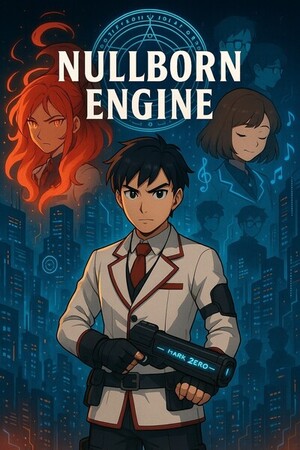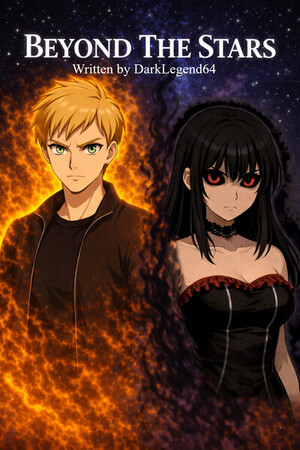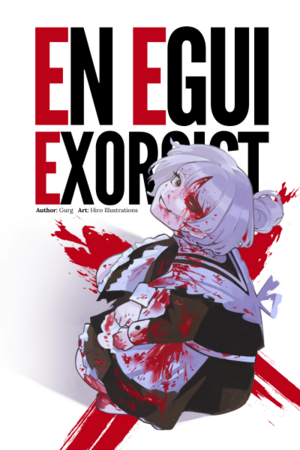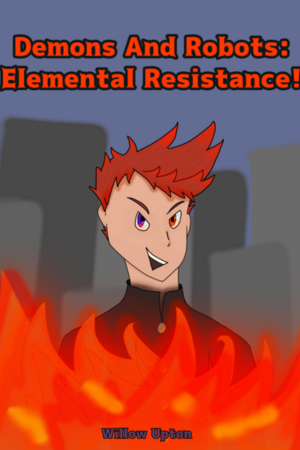Chapter 7:
Rivalry Forged
Nullborn Engine
The cheer didn’t sound real from the center of the arena. It sounded like a storm happening in someone else’s sky.
I lowered the wooden sword and the world rushed back—smell of smoke, grit in my teeth, the ache in my burned palm flaring now that it had permission. The wards dimmed; the ring’s glow pulled away from us like the tide. Siphon vents in the rafters sighed, drinking the last loose heat. The scoreboard glyph above the arch rolled from CAPTURE: ACTIVE to SAFE, and the injury sprites hovering near the boundary drifted closer, their little red-cross sigils blinking curious, not urgent.
Ayaka took one step back and the space between us felt like a drawn line. Up close, her eyes weren’t cold. They were hot in a disciplined way, ember-bright, like a forge that knew exactly how much heat was enough. A strand of her red hair had worked loose; it caught the overhead lights and glowed like a quiet verdict.
“You’re still an idiot,” she said, voice low enough that the closest three rows leaned in and missed it anyway. “But you’re my rival now. Don’t embarrass me.”
Before I could say thank you or sorry or what just happened, she turned on her heel and walked to the edge of the ring, posture perfect, coat settling like punctuation.
My knees decided they had notes. I ignored all of them. I slid Mark Zero into its case with my good hand and realized my good hand was actually my worse hand and my worse hand was on fire. The sound-rune under the rail, quiet through the last salute, gave a single low, worried tone like it had an opinion about my life choices.
The medic found me by following the smell of burned protagonist.
“Sit,” she ordered, shoving me onto a bench in the tunnel. Her cart rattled—iron, ointments, and competence. “Hand.”
I gave it over. The skin was an ugly quilt of angry red and forming blisters, the outline of the crystal cradle stamped faintly into my palm like I’d shaken hands with a star.
“Great,” the medic muttered. “Performance charging. Love that.” She dabbed something that hissed and went cold—mint and ozone. “Hurt?”
“Yes,” I said, trying not to clench.
“Good. Your nerves work.” She wrapped the palm in a clean, precise bandage and glared at me like it had been my idea to be born in the wrong body. “No training with that hand for a day. If you touch a hot crystal again, I’ll put you in a cast and glue your sword to it so you can look at what you’re missing.”
“Yes, ma’am.”
“Don’t ‘ma’am’ me. Hydrate.”
A thermos materialized in front of my face like a miracle that smelled faintly of jasmine.
“I brought—” Hana started, then flinched as if she’d bumped into a sentence she wasn’t supposed to say. Her cheeks were already pink from shouting earlier; now they went cherry. “I—tea. For…not dying.”
The medic smirked at the thermos like she approved of its moral character. “Good. Keep him alive. Next.”
Hana edged onto the bench as the medic moved away. Her hands shook, just a little, as she checked the wrap like she needed to be sure it wasn’t an illusion playing on her worry. A slim band around her wrist—a tonic band stamped Harmonics & Restoration—caught the tunnel light and answered with a soft, almost musical blink. Her humming tried to start and thought better of it.
“I’m okay,” I said, which was at least halfway true. The pain had receded to a dull roar. The part of me that had been shaking since the locker room was quiet in a new way—like the wire had decided it could hold.
She bit her lip. “You…you caught fire with your hand.”
“Borrowed,” I said. “For a second.”
“That’s not better,” she whispered, and then her eyes went glassy in a way that made my chest misstep.
“I had a purpose,” I added quickly, hearing Kaien in the back of my head: Pain is not a strategy. If you choose it anyway—choose it with a purpose. “It wasn’t…reckless. It was planned reckless.”
“That’s worse,” she said—then laughed because she couldn’t help it, which made me laugh because I couldn’t, either.
“Temo!”
Renji crash-landed into the scene like a celebration in human form. He clapped me on the shoulder, realized which shoulder connected to the bad hand, winced, and patted the air near me instead. “You were incredible. Do you know how incredible? The crowd doesn’t even know how incredible, and I am the crowd.”
Kenji slid in behind him, breathing like someone who had remembered he had lungs thirty seconds ago. He opened his notebook with a snap and stabbed at a column. “Impossible,” he said, and then, after a beat, “Statistically improbable. But nonzero. Which means repeatable under specific conditions. Which we will never, ever attempt again.”
“Absolutely we will,” Renji said, beaming. “But smarter.”
“Smarter would be not at all,” Kenji said dryly, then glanced at the bandage and, to his surprise, softened. “You did well.”
The tunnel brightened—not because the lamps did, but because attention had decided to move our way like a river finding a new bed. Ayaka had reappeared at the mouth of the tunnel, hands in her coat pockets, posture casual the way a blade is casual on a table.
For a heartbeat, she looked at me like the duel was still happening and she’d found a new angle to test. Then her gaze flicked to Hana’s fingers near my bandage, to Renji’s grin, to Kenji’s open notebook, and the casual turned into something more complex.
“Don’t overwrap his hand,” she said to Hana without looking, as if the bandage’s tightness were an affront to her personal excellence. “He needs circulation.”
Hana bristled. “I know.”
Ayaka blinked slowly, as if considering whether to be offended. “Good.” She shifted her eyes to me again, expression sharpening. “Don’t get the wrong idea,” she said, and Renji mouthed tsundere behind her back so hard his lips almost fell off. “I’m not here to fuss. I don’t want to lose to someone who collapses after one duel.”
“Duly noted,” I said, because if I said thank you again, she might actually set me on fire.
She moved closer. The heat coming off her wasn’t literal now; it was the force of attention shaped like flame. Up close, I could see a streak of soot along her cuff she’d somehow missed and the faintest rise-and-fall of breath that hadn’t quite settled yet. She’d been working as hard as I had. She didn’t show it. She wouldn’t.
“Your shot was ugly,” she said quietly. “Unstable. If my footing had been better, it wouldn’t have landed.”
“I know,” I said.
Her mouth twitched. “Good. Make the next one beautiful.” She hesitated just long enough for an entire thesis to live and die behind her eyes, then added, looking not at me but somewhere at my collarbone, “Don’t…burn your hand like that again.”
Hana made a tiny noise—yes, exactly. Ayaka’s gaze slid to her; static built between them so fast Renji actually pulled his scarf up as a shield.
“I was first,” Hana blurted, then turned puce as the sentence left her body and refused to return. “I mean—I was here first. With the bandage. He doesn’t need— he already— I can—”
Ayaka’s eyes narrowed in interest, like she’d discovered a second protagonist in the same story and needed to reconfigure the arc. “Can you.”
“I—yes,” Hana said, and then, softly but with all of her, “I can take care of him.”
The silence that followed was the rare kind: respectful. Even Renji did not clap, though you could tell he wanted to.
Ayaka crossed her arms. “Fine. Then do it properly. He needs his hands.” She looked back at me, smirked as if she hadn’t just conceded a point in a game no one had announced. “Rest. Rivalry resumes tomorrow.”
She pivoted and left, trailing the kind of attention you only get if you’ve earned it a hundred times before.
Renji exhaled an entire speech. “I will be accepting awards on your behalf for forcing an unstoppable force and an immovable object to argue outside the physics building.”
Kenji closed his notebook and, for once, patted my shoulder. “Drink your tea,” he said. “Then rooftop.”
Hana was still red. She took the thermos back gently and pressed the cap into my good hand. “Sip,” she murmured, eyes on the wrap. “Slow.”
I sipped. The warmth spread from my mouth down the sternum, over the drumbeat in my palm, to a place lower in the chest that had been cinched tight since morning and now remembered how to open.
“Thank you,” I said, because there wasn’t a better phrase, and she gave me a tiny, luminous smile that made the tunnel feel like sunlight.
—
By the time we reached the rooftop, the city had lit its evening stars—thousands of mana lamps ticking on like the world had remembered how to glow. Skyrails looped bright curves between towers; the academy’s perimeter bubble shimmered, old wards shaking hands with new circuits.
Renji dropped onto the concrete like gravity had suddenly found him. “Ladies, gentlemen, and Kenji,” he announced, “we are gathered here to celebrate a miracle.”
“If you say ‘miracle’ you absolve yourself of the work that made it possible,” Kenji said, sitting neatly, like a sentence ending in a period. “Say ‘statistical upset.’”
“Statistical miracle,” Renji compromised.
I lowered myself more carefully; the burns tugged with an opinion. Hana had me sit where the wind couldn’t needle the bandage. She laid out gauze, ointment, and tape with shy ritual. The tonic band at her wrist gave a shy pulse.
Renji produced a bundle from somewhere in his jacket like a magician comforted by snacks. “I present: victory donuts. And also a vegetable bun for Kenji, because he scares me when he hasn’t eaten.”
Kenji accepted the bun with the quiet grace of a man who kept friends as a hedge against himself. “Thank you.”
Hana unwrapped my bandage with gentle precision. The air nipped at raw skin; I hissed despite myself. She bit her lip, eyes narrowing with a focus that made me feel both seen and unworthy.
“I’m sorry,” she whispered. “Almost done.”
“You don’t have to—”
“I want to,” she said, and then blushed at her own mouth. “For…health reasons.”
“Right,” I said gravely. “Of course.”
She couldn’t look at me, so she looked at the wound instead—and hummed.
It was barely sound at first, more intention than note. The tonic band at her wrist lit with a small, obedient glow; the fresh gauze threads answered, catching the pitch and holding it like light in water. Heat bled out of my palm in slow waves; pain unhooked its claws and settled into a dull ache. The sound-rune tucked under Mark Zero’s rail—resting in its case beside us—gave a soft harmonic in sympathy, like it had chosen to listen.
“I don’t really…sing,” she murmured, breath close to the hum. “Humming is enough for burns.”
“What track is that?” Renji asked, suddenly careful, like loudness might spill the note.
“Harmonics & Restoration,” she said, nearly too quiet to hear. “Low-grade work is safe. If I push, I get…lightheaded.” She smiled a little, embarrassed. “So I don’t push.”
Kenji’s eyes softened behind his glasses. “Sensible.”
She finished the wrap—not tight, just right—and smoothed the edge with her thumb, soft as a bow on a present. The rooftop wind seemed to shift its pitch to match hers and then, when she stopped, went back to being wind.
Renji lay on his back and watched a cloud try to decide what shape to be. “So. Ayaka was…different.”
“How,” Kenji asked, which is what you ask when you noticed it, too.
“Before the duel she looked at Temo like a problem,” Renji said. “After, she looked like…someone who started a hobby against her will and doesn’t want to admit she enjoys it.”
“That is an unhelpful metaphor,” Kenji said.
“It’s the best kind,” Renji said.
Hana capped the ointment, still pink. “She cares,” she said, tiny but true. “She won’t say it. But she—”
A voice came from the doorway, sharp enough to clip off the sentence.
“Cares about what.”
Ayaka stepped onto the roof with the absolute entitlement of a person who had conquered the concept of permission. Arms crossed, chin up, expression defaulting to unimpressed. A half-moon of quiet followed her like a cloak.
Renji sat up, grinning like a criminal. “Welcome to the Outcasts’—excuse me, the Statistical Miracles Club.”
“We’re not calling it that,” Kenji said, but he didn’t sound entirely opposed.
Ayaka surveyed the scene—the dwindling donuts, the bandage kit, my wrapped hand lying obediently in my lap. She looked at Hana, and even though the air temperature did not change, a draft went through the middle of my life.
“I came,” Ayaka announced, “to ensure my idiot rival does not slack off after one lucky win.”
Hana bristled. “He’s not an idiot.”
Ayaka arched a brow. “He burned his hand on purpose.”
“It had a purpose,” Hana shot back, cheeks pink but eyes steady. “And he won.”
Ayaka’s mouth opened, then shut, as if Hana had stolen the second sentence and left her with a third she wasn’t ready to say.
“I’m going to keep training,” I said before the wind decided to throw us off the roof. “I have to. Today wasn’t…enough. I got lucky and didn’t waste it.”
Ayaka looked at me like a teacher who wanted to be impressed and hated being impressed and had been impressed anyway. “Good,” she said. Then, almost too quiet to hear: “Don’t make me regret calling you my rival.”
A warmth that wasn’t pain climbed my chest. “I won’t.”
Renji clapped once, startling a pigeon that had landed to eavesdrop. “Excellent. With that settled, we proceed to agenda item two: Project Mark One.”
Kenji groaned. “There was an agenda.”
“There’s always an agenda,” Renji said. “Mark Zero is too big, too heavy, and too beautiful for this cruel world. We shave weight, re-path recoil, and—” He pointed at me with the theatricality of a doomed wizard. “—do not glue the sight straight. That crooked gaze is his soul.”
Ayaka squinted. “You glued your gun together.”
“Bonded,” Renji corrected. “With artisanal resin.”
She pinched the bridge of her nose, a very human crack in otherwise perfect stone. “Boys.”
Hana hid a smile behind the rim of the thermos and poured tea into small cups like she could fix the planet’s axis with hospitality. She offered one to Ayaka without looking her fully in the face, the way you extend a truce without swallowing your pride.
Ayaka accepted it like she was doing the cup a favor and sipped. Her eyes widened a fraction. “This is good.”
Hana brightened in a way that would have fueled a small town. “Thank you.”
The door creaked again. I expected silence. Instead, Kaien’s voice arrived from the stairwell like a thesis with legs.
“Feet.”
We all turned like someone had said our names. Kaien didn’t step onto the roof; he stood in the doorway with the light behind him, making common sense look dramatic.
“Feet,” he repeated to me. “Tomorrow at dawn.”
“Yes, sensei.”
His gaze flicked over the bandage and approved or disapproved in a way that looked the same but felt different. “Don’t confuse one victory with a finished poem,” he said. “Train the lines until the page holds.”
“Yes, sensei.”
He vanished. The door sighed shut. Silence did not quite return; something like expectation took its seat instead.
Renji leaned over, eyes sparkling. “Do you think sensei writes poetry?”
“No,” Kenji said immediately.
“Maybe footwork poetry,” Hana said, earnest.
Ayaka looked at me over the rim of her cup. There was a question there—several—and the shape of a smile she was refusing to let happen.
“Tomorrow,” she said, as if warning me and herself at the same time.
“Tomorrow,” I agreed.
She set the cup down, nodded at Hana without quite making eye contact, and left the way she had arrived: like gravity was a polite suggestion.
Renji fell backward dramatically and stared at the sky. “I’m living for this arc.”
“You’re living because you avoided getting punched by Himura,” Kenji said.
Hana repacked the bandage kit with careful efficiency. When she finished, she sat with her knees drawn up, hands around the thermos, eyes on the city like it had confided in her and asked her not to tell.
“Thank you,” I said again, because I kept finding new reasons to say it.
She shook her head. “You don’t have to thank me. We…we’re a team.” She hesitated, then added, as if closing a circuit: “And if it’s okay… I can hum again later. It helps.”
“It does,” I said, and the sound-rune in the case gave a tiny, conspiratorial ping as if to agree.
We talked until the lamps below blurred into a sea and the wind decided we were part of the rooftop and not intruders. Renji plotted upgrades, Kenji listed reasons we’d die, Hana vetoed the dying, and I let the rhythm of their voices file down the fear until it had edges I could hold.
—
Elsewhere, far from the rooftop’s little republic, in a glass office that reflected the academy’s lights until they looked like captured stars, a boy watched the duel again.
Riku Senzai sat with one leg crossed, a finger tapping idle rhythms on his armrest. Family crest—thin, expensive—etched on the window like a promise. He looked bored until the moment the blast went off from Mark Zero. Then he smiled—a careful expression that didn’t waste itself on joy.
“Interesting,” he murmured to the empty room. “Even trash can burn if you set it right.”
He rewound the footage. He watched my feet.
“Feet, not fear,” he repeated, tasting the phrase like a wine he intended to counterfeit. “We’ll see.”
He closed the file and the room went dark except for his reflection—smiling back with a promise the lights couldn’t hear.
—
I fell asleep at my desk with the notebook open and a pencil in my good hand. The page had two columns: Fix and Future.
Under Fix: shave weight; re-path recoil; mount alignment (keep Renji’s crooked sight, maybe); chamber heat bleed away from palm.
Under Future: split frame; quick-change chamber; blade—not for now. For later. For when close doesn’t mean desperate; it means chosen.
In the corner I wrote, again, because I needed to: Make her fight my story.
Outside, Seiryoku’s wards hummed their nighttime song, steady and indifferent and exactly right. Inside, my burned hand ached in time with my heartbeat, which ached in time with something else—something that had been quiet for a long time and wasn’t anymore.
The world belonged to the gifted.
The ring belonged to the brave.
And for the first time, I believed I could be both, on purpose.




Please sign in to leave a comment.